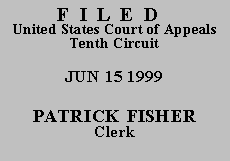

| HOWARD GLAZE,
v.
STEVE HARGETT |
No. 98-6403
(D.C. No. 98-CV-272) |
Howard Glaze, an inmate within the Oklahoma State prison system, appeals the district court's denial of his petition for habeas relief. We conclude that Glaze's petition is time barred and dismiss.
Glaze filed his habeas petition pursuant to 28 U.S.C. § 2254. In reviewing a denial of a habeas petition, we examine the district court's factual findings for clear error and its legal conclusions de novo. See Wildermuth v. Furlong, 147 F.3d 1234, 1236 (10th Cir. 1999).
The Anti-Terrorism and Effective Death Penalty Act of 1996 ("AEDPA"), which took effect on April 24, 1996, provides that "[a] 1-year period of limitation shall apply to an application for a writ of habeas corpus by a person in custody pursuant to the judgment of a State court." 28 U.S.C. § 2244(d)(1). A prisoner whose conviction became final prior to the effective date of AEDPA has a grace period of one year from April 24, 1996, to file a petition for habeas relief. See United States v. Simmonds, 111 F.3d 737, 746 (10th Cir. 1997). Moreover, "[t]he time during which a properly filed application for post-conviction. . . review. . . is pending shall not be counted toward any period of limitation." 28 U.S.C. § 2244(d)(2).
We agree with the district court's determination that Glaze had until December 11, 1997, to file his habeas petition. Because Glaze did not file his petition until February 28, 1998, it is untimely. We reject Glaze's claim that he is entitled to an additional tolling period of ninety days to account for the period during which he could have sought review of the state court's denial of his petition for post-conviction relief by the United States Supreme Court. See Sup. Ct. R. 13 (indicating that a petition for a writ of certiorari is timely when it is filed within ninety days following the entry of judgment). We agree with the district court's conclusion that the tolling period under § 2244(d)(2) does not apply to the time during which a petitioner could seek Supreme Court review of denial of post-conviction relief. See Hoggro v. Boone, 150 F.3d 1223, 1226 (10th Cir. 1998) (noting that the time period to be tolled under § 2244(d)(2) is the time "spent in state court"); see also Harris v. Champion, No. 98-6318, 1999 WL 84476, *1 (10th Cir. Feb. 22, 1999) ("[O]nce the Oklahoma Court of Criminal Appeals affirmed the denial of [the] application [for post-conviction relief],. . . the one-year limitations period once again began to run."); Thompson v. Simmons, No. 98-3270, 1999 WL 339697, *3 (10th Cir. May 31, 1999) ("[O]nce the Kansas Supreme Court denied his state habeas petition. . . the clock began to run on [the petitioner's] one-year federal habeas time limitation period.").(1)
Because Glaze sought habeas relief after the expiration of the applicable limitations period, we DISMISS this petition. We further conclude that Glaze has not made a substantial showing of the denial of a constitutional right and DENY a certificate of appealability. See 28 U.S.C. § 2253(c)(2). Finally, we DENY leave to proceed in forma pauperis.
The mandate shall issue forthwith.
ENTERED FOR THE COURT
Carlos F. Lucero
Circuit Judge
*.The case is unanimously ordered submitted without oral argument pursuant to Fed. R. App. P. 34(a)(2) and 10th Cir. R. 34.1(G). This order and judgment is not binding precedent, except under the doctrines of law of the case, res judicata, and collateral estoppel. The court generally disfavors the citation of orders and judgments; nevertheless, an order and judgment may be cited under the terms and conditions of 10th Cir. R. 36.3.
1. We further reject Petitioner's assertion that AEDPA does not apply to him because his conviction preceded its enactment. See Simmonds, 111 F.3d at 746; Hoggro, 150 F.3d at 1225-26 (both applying AEDPA to petitioners whose convictions preceded AEDPA's enactment). Moreover, we reject Glaze's assertion that because he committed the underlying offenses prior to AEDPA's enactment, application of AEDPA to his petition violates the Ex Post Facto Clause. The Ex Post Facto Clause applies when a law retrospectively alters the definition of criminal conduct or increases the punishment for the crime. See Lynce v. Mathis, 519 U.S. 433, 441 (1997). Application of AEDPA to Glaze's petition creates neither of these problems.